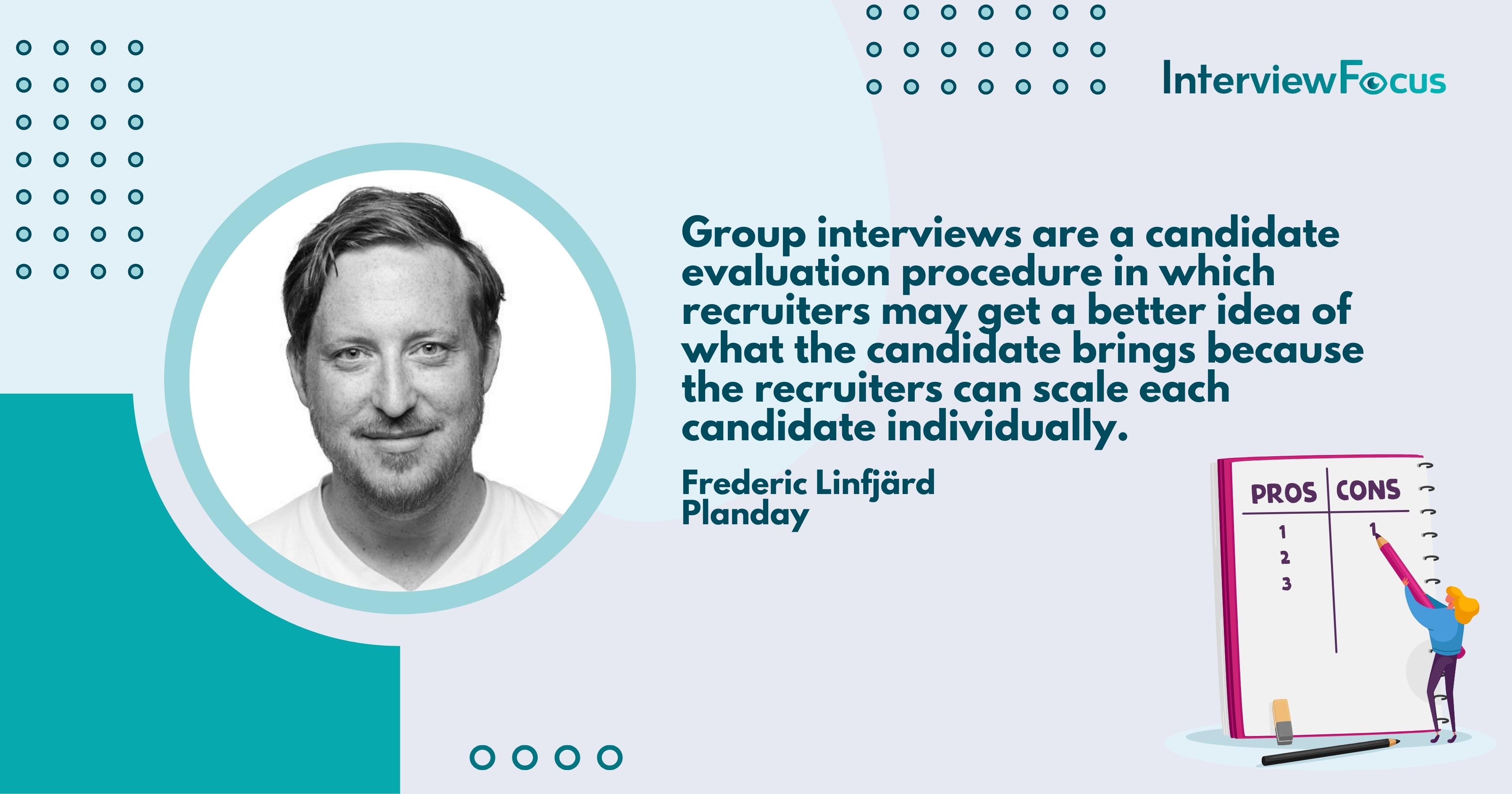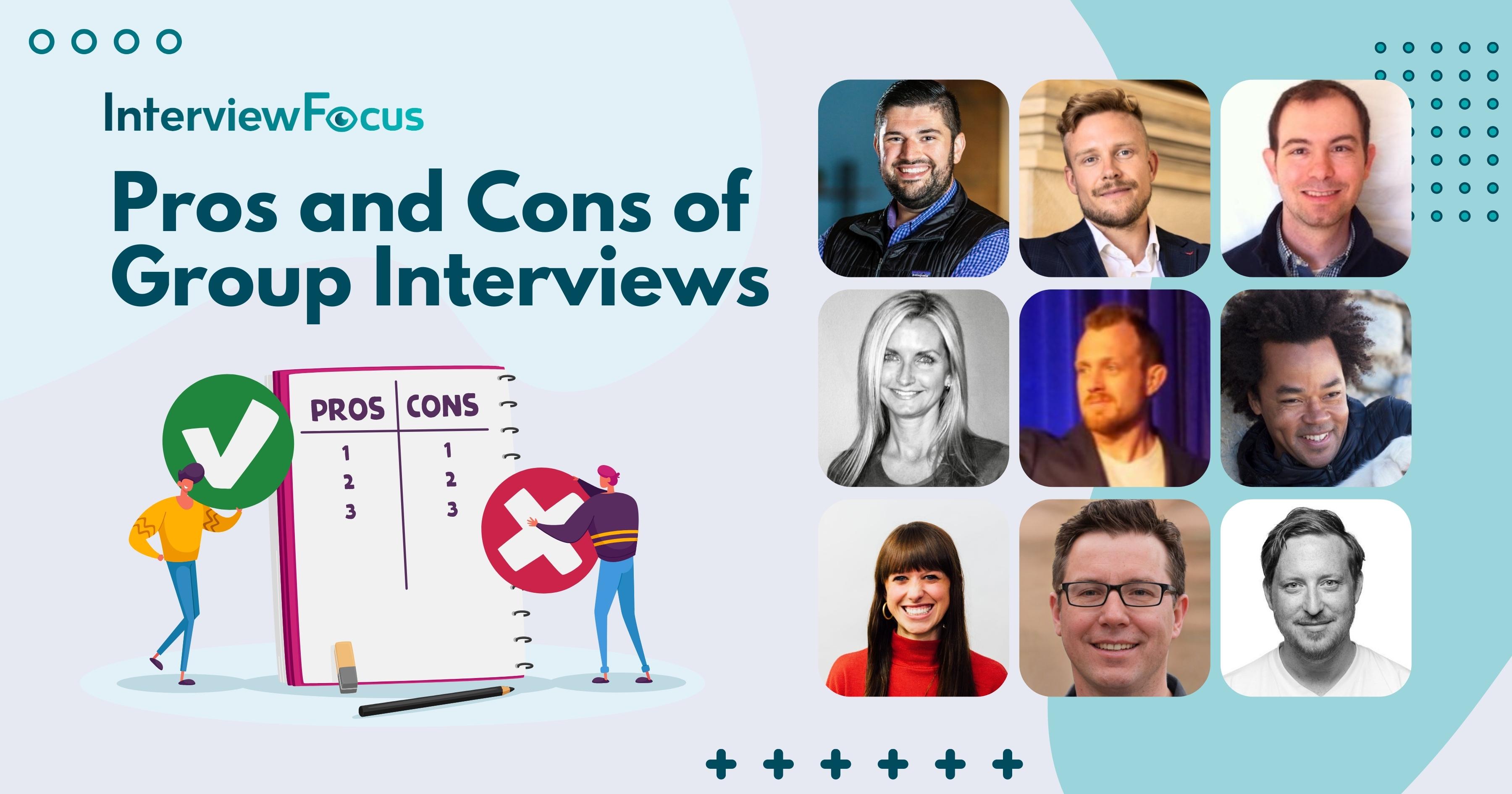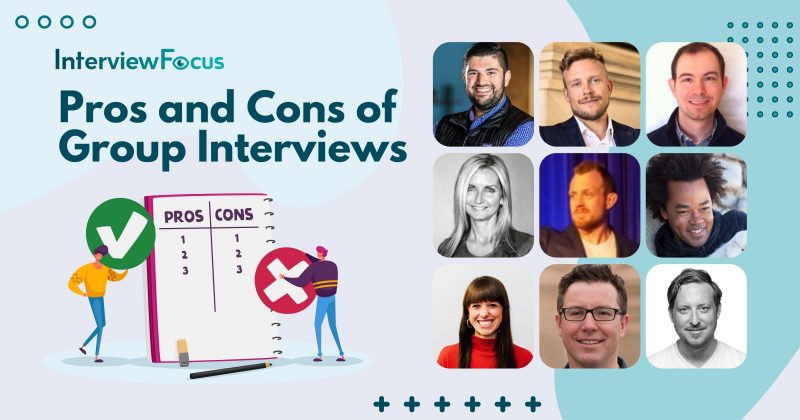What are the pros and cons of participating in group interviews?
You’re on the job hunt and you get the illusive email that you’ve been waiting for offering you the opportunity at your dream job. But two words give you pause in that email: group interview. There are mixed opinions on batch interviews, with strong stances on either side.
That’s why we asked 12 recruiting experts and HR professionals to weigh in with their pros and cons for why you should consider participating in group interviews. Read on to know what you should be expecting before, during, and after your interview so you’re prepared to handle whatever the group may throw at you.
- Pro: Seeing Workplace Culture and Relationships Firsthand
- Pro: Relaxes Candidates
- Con: Groupthink Pressures People to Change Opinion
- Pro: Opportunity to See the Best in Action
- Pro: Leads to Equitable Hiring Practices
- Pro: Offers a Learning Opportunity
- Pro: Talent Shines Like a Diamond
- Con: Overly Complex for Little Gain
- Con: Harder to Get to Know Someone in a Group Setting
- Mix: Interview Atmosphere Should Reflect the Role
- Pro: A Stage to Present and Showcase Fundamental Skills
- Pro: Speed and Less Time Wasted
Pro: Seeing Workplace Culture and Relationships Firsthand
I love pairing folks up for 2:1 interviews, especially if the interviewers are at or around the same level at which the candidate would come in, or if they’d both report into the candidate. It’s a great way to see the personal dynamics; I coach these interviewers to prepare together and to bounce off one another when answering questions from the candidates at the end. Especially now, when many interviews are done on Zoom, it’s a way of seeing culture and relationships in action, and these are consistently the interviews about which I hear the most positive feedback from my candidates after their interview process.
Patrick Ward, Halloran Consulting Group, Inc.
Pro: Relaxes Candidates
One pro of group interviews is they can help to create a more relaxed atmosphere for the candidate, which may lead to more honest answers and better overall performance. This is because they will be able to see how other people interact with the interviewer and ask questions. This can also help them to practice their interviewing skills.
Additionally, group interviews can help potential employers get a better sense of how the candidate interacts with others. This can be especially helpful in positions that require teamwork or regular interaction with customers or clients.
Johannes Larsson, JohannesLarsson.com
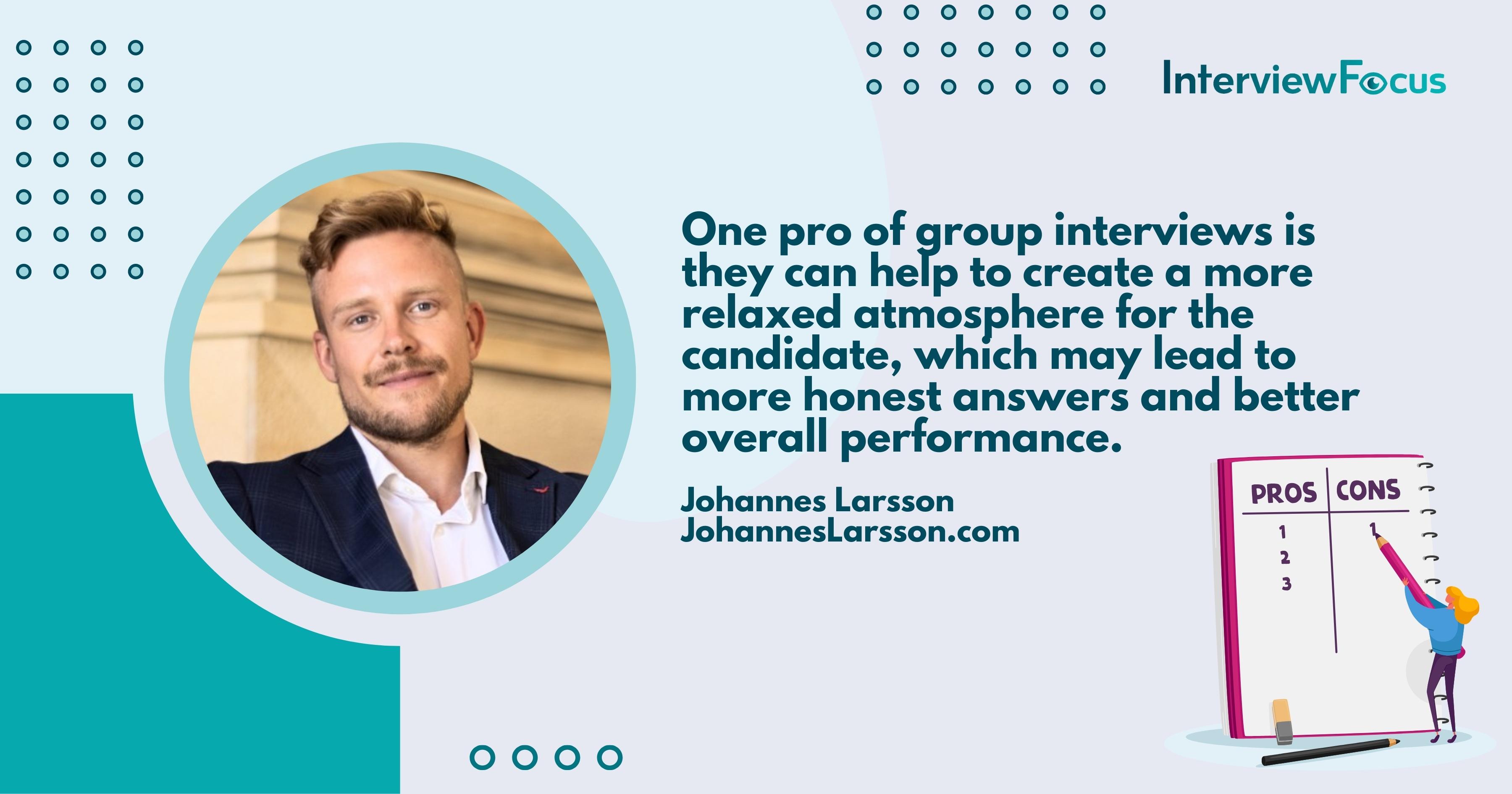
Con: Groupthink Pressures People to Change Opinion
Humans often compare and contrast their opinion with a standard (the standard can be someone else’s opinion). Therefore, someone’s opinion or decision can easily be influenced by other people especially when they are in a group. So, person A may want to say something entirely different, but because person B, C, and D had similar opinions, person A may feel pressured to alter their opinion and go along with the larger group. So, a group interview may not be the right approach if you want to get unbiased and honest feedback from each individual.
Simon Bacher, Simya Solutions
Pro: Opportunity to See the Best in Action
An advantage of group interviews is to see how candidates collaborate with each other, how they show their skills, and just hang out. In group interviews, there is competition between all the candidates, and every candidate tries hard to give their best. They give 100% to control themselves and defeat fear and pressure. I firmly believe that, in the group interview setting, only a well-qualified candidate can survive and show their skills.
Josh Tyler, Tell Me Best
Pro: Leads to Equitable Hiring Practices
Group interviews are a great opportunity to expand diversity, equity, and inclusion initiatives. You can make your hiring practices more equitable with interview panels that include people from different backgrounds. This will allow for a well-rounded view of potential candidates and highlight strengths that might not have been seen by a more homogenous panel.
Nir Leibovich, GoCo
Pro: Offers a Learning Opportunity
There is tremendous value in holding panel interviews if they are composed of diverse individuals coming from cross-functional areas of the business. If a proper debrief session is held immediately following an interview, there is an opportunity to learn from one another’s perception of the candidates’ answers and the impact in which they might have across the business. Each time I have participated in a group interview, I have walked away with a fresh perspective, having learned something new. On the flip side, I think it is vitally important to provide candidates with a warm welcome and clear overview of the interview process to put them at ease.
Michele Kalas, Mattress Firm
Pro: Talent Shines Like a Diamond
An old saying, “Talent always shines like a diamond” means a highly skilled and talented candidate will get the top position in a group interview. In the group interview, everyone tries their best to showcase their skills and prove they’re better than the rest of the group, so it’s beneficial that the one who has the best capabilities gets highlighted. Whoever has less potential is left behind.
Joe Troyer, Digital Triggers
Con: Overly Complex for Little Gain
Complexity is the enemy of execution, and group interviews to put it simply are more trouble scheduling than their worth. The last thing people want is more meetings to bog down their schedules and even if they were feeling particularly enthusiastic, it’s surprising how difficult it actually is to find time in everyone’s schedules to sit down and chat.
Patrick Robinson, Paskho
Con: Harder to Get to Know Someone in a Group Setting
Group interviews are great because they allow you to get a candidate in front of multiple people without asking them to take an obscene amount of time from their jobs and/or life. One downside is that group interviews are often more intimidating for the candidate (especially if it’s for a role that doesn’t require presenting in front of a group) and they don’t always provide the best candidate experience. If the candidate is nervous or doesn’t feel comfortable, it’s going to make it harder for them to open up. And if your candidate can’t open up, you’re going to get a lot less out of the interview than if they feel totally comfortable. If the goal is to dive deep and understand how someone will do in the role, an individual interview might be a better approach.
Alyssa Rhoda, Zefr
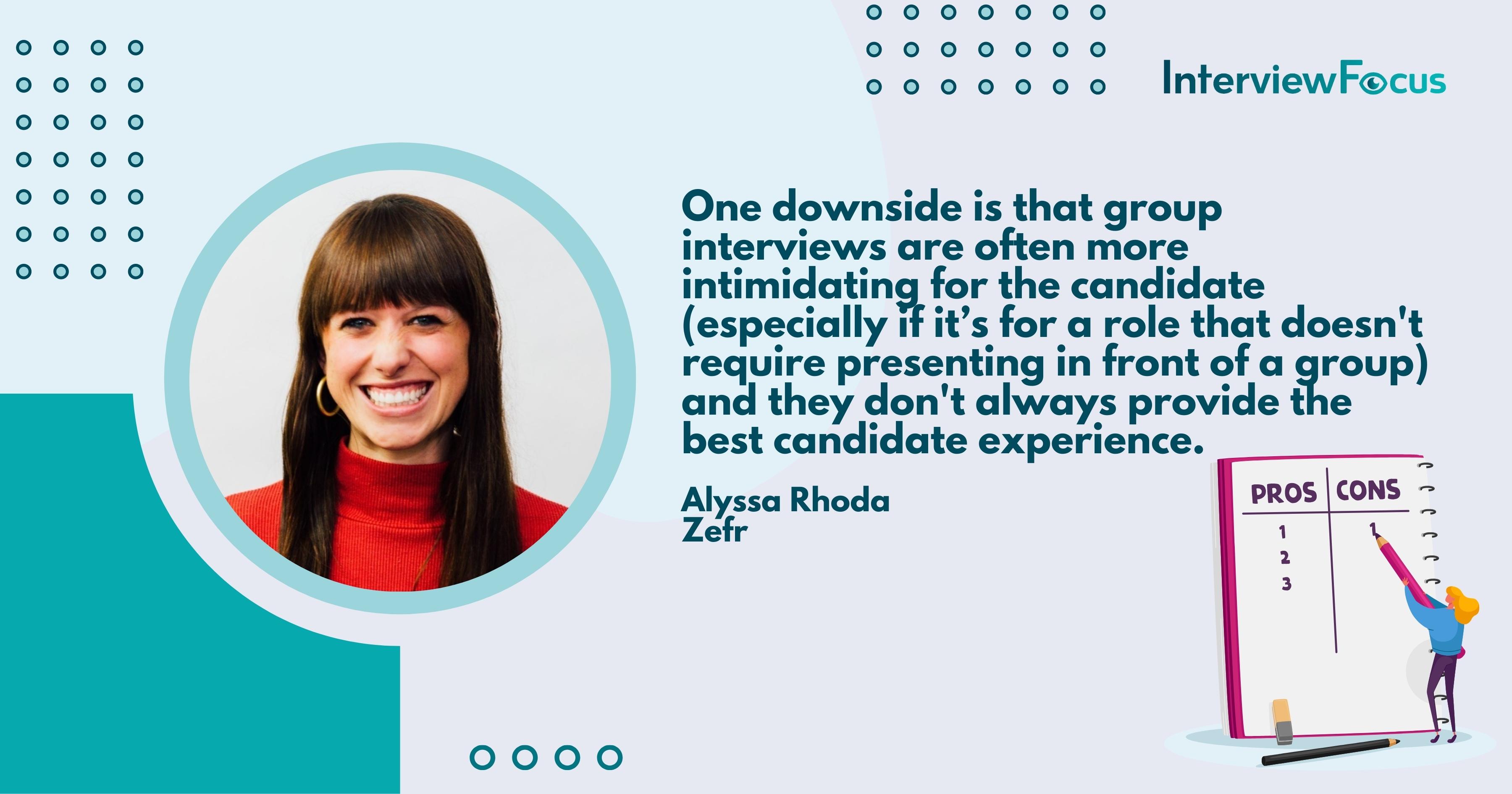
Mix: Interview Atmosphere Should Reflect the Role
Group interviews might be less stressful, but they also have the effect of making the interview process hyper-competitive which can be good or bad depending on the role you’re hiring for. For example, it might not be the best idea to conduct a group interview for a remote engineering position such as a cloud engineer because the test might not be the best for the ideal candidate’s temperament. On the flip side, a group interview might be perfect for a sales position where you’re interested in finding out who has the loudest voice and can be heard amongst the noise, a very valuable skill indeed.
Michael Burghoffer, PicoSolutions
Pro: A Stage to Present and Showcase Fundamental Skills
Different people have unique opinions on choosing between the group and personal interviews. Both ideologies bring their stakes and chances to choose the best candidate. For me, it proves to be a game changer for a deserving candidate. The reason is that the group setting helps you present your fundamental skills in front of people. The focus group interview style looks to understand what makes a capable person outshine the rest of the flock.
While for the candidate, it can be an advantage to bring out your views and ideas in front of similarly skilled people. There are many times when the interviewed person is not comfortable talking around many people, yet to make this your advantage, composing yourself can help you find the right words to say.
Alexander Reid, TriviaWhizz
Pro: Speed and Less Time Wasted
Quick selection is definitely a pro. This is a win-win situation for both recruiters and candidates. Group interviews are a candidate evaluation procedure in which recruiters may get a better idea of what the candidate brings because the recruiters can scale each candidate individually. As a result, recruiters may swiftly choose and reject individuals, saving time and effort. If you feel you need more time, you can move forward with traditional interviews with that strong selection of candidates, and spend enough time meeting and getting to know each one.
Frederic Linfjärd, Planday
